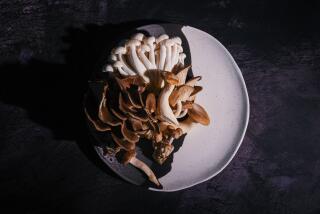Second Victim of Mushroom Poisoning Gets a New Liver
- Share via
Surgeons at UCLA Medical Center performed an emergency liver transplant late Saturday on Wilhelm Winter, one of two Oakland residents who mistakenly picked and ate lethal Death Cap mushrooms on a New Year’s outing in Marin County.
The operation on Winter, 45, came three days after doctors gave a new liver to his 19-year-old companion, Cynthia Zheng. They are believed to be the second and third persons in the United States to receive liver transplants to treat life-threatening cases of mushroom poisoning.
“They’re both critical but stable,” a UCLA nursing supervisor said Sunday, declining to comment on the prognosis for recovery. “You can’t tell anything at this stage. It’s too early to tell.”
Winter entered surgery late Saturday night for an operation that did not conclude until early Sunday, the supervisor said. Doctors had been monitoring his condition through much of the week to determine whether a transplant would be necessary.
Condition Worsened
“This sometimes happens,” she said. “They can fluctuate, get better and then go down again--and that’s what he did. He got worse and he did get the new liver.” The hospital spokeswoman would not identify the liver donors.
Zheng, who became ill first from eating the mushrooms, received a new liver Wednesday in an operation that took seven hours.
She and Winter had relied on a field book containing pictures of dangerous mushrooms when they picked foods for an outdoor meal, said Dr. Robert Benjamin of the Alameda County Health Care Services Agency. However, not all mushrooms in the wild look alike, he said.
Zheng entered an Oakland emergency room Jan. 2 complaining of abdominal cramps, nausea and diarrhea. She brought samples of the mushrooms with her at the time. They were found to be Amanita phalloides, one of a group of mushrooms containing a toxin that kills liver and kidney cells.
Winter was later summoned to the hospital and began showing symptoms of the poisoning. They were transferred to UCLA because of the Medical Center’s capability for performing emergency liver transplants, authorities said.
More to Read
Sign up for Essential California
The most important California stories and recommendations in your inbox every morning.
You may occasionally receive promotional content from the Los Angeles Times.













